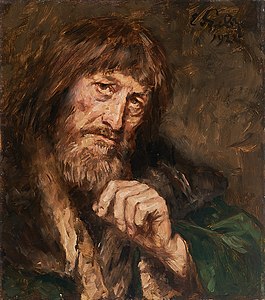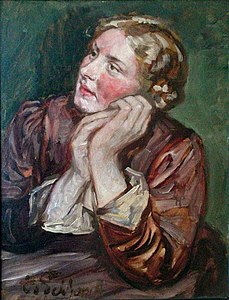| This article needs additional citations for verification. Please help improve this article by adding citations to reliable sources. Unsourced material may be challenged and removed. Find sources: "Eduard von Gebhardt" – news · newspapers · books · scholar · JSTOR (July 2022) (Learn how and when to remove this message) |
| Eduard von Gebhardt | |
|---|---|
 Self-portrait (date unknown) Self-portrait (date unknown) | |
| Born | 13 June 1838 Järva-Jaani |
| Died | 3 February 1925 (1925-02-04) (aged 86) Düsseldorf |
| Nationality | Baltic German |
Franz Karl Eduard von Gebhardt (13 June 1838 – 3 February 1925) was a Baltic German painter of portraits and historical scenes, and a professor at the Kunstakademie Düsseldorf.
Biography
He was born to Ferdinand Theodor von Gebhardt (1803–1869), Provost and member of the Consistorial Council in Reval, and his wife, Wilhelmine, née Von Glehn (1808–1880). He graduated from the local gymnasium at sixteen, and enrolled at the Imperial Academy of Arts in Saint Petersburg, where he studied for three years.

He then spent two years travelling, spending some time in Karlsruhe, where he took classes at the Academy of Fine Arts. He arrived in Düsseldorf in 1860, and became a student of Wilhelm Sohn, who gave him such wholehearted encouragement that he decided to stay there. He settled on a street which was the home of several other artists and their studios.
In 1872, he married a local woman, Klara Jungnick (1851–1897). The following year, he was named a professor at the Kunstakademie. His best-known students included Otto Boyer and Carl Schmitz-Pleis.

On the occasion of his seventieth birthday, in 1908, the Galerie Eduard Schulte [de] in Berlin held a large exhibit of his works. At the Große Berliner Kunstausstellung of 1918, he was awarded a gold medal. Not long before his death he became an Ehrenbürger (Honorary Citizen) of Düsseldorf. He was interred at the North Cemetery [de].
His home and studio at Rosenstraße Nr. 41 became a retirement home for the Mutual Aid Association of the Verein der Düsseldorfer Künstler [de]. Streets were named after him in Essen and Wuppertal.
Work

Due to his father's profession, he was inclined to religious themes from the beginning. His models were the Dutch and German masters of the 15th and 16th centuries, and he strove for a realistic presentation. It was said that what he gained in truthfulness was a loss for beauty. Some of his best-known Biblical scenes are:
- "Christ on the Cross" (1866, St Mary's Cathedral, Tallinn)
- "The Last Supper" (1870, National Gallery, Berlin)
- "Crucifixion" (1873, Hamburg Kunsthalle)
- "Ascension of Christ" (1881, National Gallery, Berlin)
- "Taking Care of Christ's Body" (1883, Dresden Gallery)
- "Jacob and the Angel" (1893, Dresden Gallery)
- "Christ and the Rich Youth" (1892, Düsseldorf Gallery)
- "Sermon on the Mount" (1893, Düsseldorf Gallery)
- "Healing of the Palsied" (1895, Breslau Museum)
- "The Raising of Lazarus" (1896, Museum Kunstpalast)
He also painted excellent portraits; making sketches of prototypical peasants, which he drew while visiting Estonia. There, he was a tutor to famous Estonian painters such as Ants Laikmaa, and the brothers, Kristjan and Paul Raud. Many of works were considered for inclusion in the series of trading cards issued by the Stollwerck chocolate company.
Other selected works
-
 Thoughtful Man
Thoughtful Man
with a Beard (1922) -
 Lazarus and the
Lazarus and the
Rich Man (1865) -
 Estonian Peasant (1867)
Estonian Peasant (1867)
-
 Doubting Thomas (date unknown)
Doubting Thomas (date unknown)
-
 Portrait of a Woman (date unknown)
Portrait of a Woman (date unknown)
References
- Civil status of the mayor's office of Düsseldorf from July 26, 1872 – marriage vows, In: Düsseldorfer Volksblatt (No. 92), 1 August 1872.
- Rosenstr. 41, (E Stadt Düsseldorf) Eduard von Gebhardt-Heim, Altersheim für Künstler vom Verein der Düsseldorfer Künstler z.g.U.u.H., in Adressbuch der Stadt Düsseldorf, 1926, pg.284.
- Meyers Großes Konversations-Lexikon, Vol.7 Leipzig 1907, pg.406–407
- Lorenz, Detlef: Reklamekunst um 1900. Künstlerlexikon für Sammelbilder. Reimer-Verlag, 2000. ISBN 978-3-496-01220-7
Further reading
- Dietrich Bieber, Ekkehard Mai: "Gebhardt und Janssen – Religiöse und Monumentalmalerei im späten 19. Jahrhundert", In: Wend von Kalnein: Die Düsseldorfer Malerschule. Verlag Philipp von Zabern, Mainz 1979, ISBN 3-8053-0409-9, pg.165 ff.
- Erik Thomson and Günter Krüger: Eduard von Gebhardt – Leben und Werk, Verlag Nordostdeutsches Kulturwerk, Lüneburg 1991 ISBN 978-3-922296-61-4
- Rudolf Burckhardt: Die Wandgemälde Eduard von Gebhardts in der Friedenskirche zu Düsseldorf : 12 Blätter mit begleitenden Worten, Pestalozzihaus, Düsseldorf 1908 (Online)
External links
- Literature by and about Eduard von Gebhardt in the German National Library catalogue
- Baltische Historische Kommission: Entry on Gebhardt, Karl Franz Eduard*. In: BBLD – Baltisches biografisches Lexikon digital
- Gebhardt, Eduard von; in the Ostdeutsche Biografie
- More works by Gebhardt @ ArtNet
- Heinrich J. Schmidt: "Eduard von Gebhard" in: Neue Deutsche Biographie (1964), pp. 119–120 (Online)
- 1838 births
- 1925 deaths
- People from Järva Parish
- People from Kreis Jerwen
- Baltic-German people from the Russian Empire
- Emigrants from the Russian Empire to the German Empire
- 19th-century German painters
- German male painters
- 20th-century German painters
- 20th-century German male artists
- 19th-century Estonian painters
- 19th-century Estonian male artists
- 19th-century German male artists